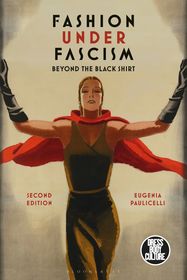
-
10% KEDVEZMÉNY?
- A kedvezmény csak az 'Értesítés a kedvenc témákról' hírlevelünk címzettjeinek rendeléseire érvényes.
- Kiadói listaár GBP 28.99
-
13 849 Ft (13 190 Ft + 5% áfa)
Az ár azért becsült, mert a rendelés pillanatában nem lehet pontosan tudni, hogy a beérkezéskor milyen lesz a forint árfolyama az adott termék eredeti devizájához képest. Ha a forint romlana, kissé többet, ha javulna, kissé kevesebbet kell majd fizetnie.
- Kedvezmény(ek) 10% (cc. 1 385 Ft off)
- Kedvezményes ár 12 465 Ft (11 871 Ft + 5% áfa)
Iratkozzon fel most és részesüljön kedvezőbb árainkból!
Feliratkozom
13 849 Ft

Beszerezhetőség
Becsült beszerzési idő: A Prosperónál jelenleg nincsen raktáron, de a kiadónál igen. Beszerzés kb. 3-5 hét..
A Prosperónál jelenleg nincsen raktáron.
Why don't you give exact delivery time?
A beszerzés időigényét az eddigi tapasztalatokra alapozva adjuk meg. Azért becsült, mert a terméket külföldről hozzuk be, így a kiadó kiszolgálásának pillanatnyi gyorsaságától is függ. A megadottnál gyorsabb és lassabb szállítás is elképzelhető, de mindent megteszünk, hogy Ön a lehető leghamarabb jusson hozzá a termékhez.
A termék adatai:
- Kiadás sorszáma 2
- Kiadó Bloomsbury Visual Arts
- Megjelenés dátuma 2025. február 20.
- Kötetek száma Paperback
- ISBN 9781350353350
- Kötéstípus Puhakötés
- Terjedelem oldal
- Méret 232x156x22 mm
- Súly 740 g
- Nyelv angol
- Illusztrációk 62 bw illus 749
Kategóriák
Hosszú leírás:
Looking at the dark history of Italian fashion by focusing on the impact of 1930s Fascism, this is the second edition of Eugenia Paulicelli's classic text.
In Fashion under Fascism, Paulicelli explores the subtle yet sinister changes to the seemingly innocuous practices of everyday dress and shows why they were such a concern for the state. Importantly, she also demonstrates how these developments impacted on the global dominance of Italian fashion today. Alongside interviews with major designers, such as Fernanda Gattinoni and Micol Fontana, this newly expanded revised edition includes updated material on gender and masculinity, the role of uniforms in standardizing individuality, race and colonial Italy, and the reception of 1930s cinema. It sheds new light on the complicated relationship between style and politics and is an essential read for all those interested in the history of fashion, politics, national identity and the culture of fascism.
Tartalomjegyzék:
List of Illustrations
Acknowledgements
Preface: Fashion/Fascism: Odd bedfellows?
Chapter 1: Introduction: Fashion/Fascism
Fashion and historiography
Methodology. Thinking Fashion, Rhythm and Spatializing Time
Object and Intersectionalities
Beyond the Black Shirt: Continuity and Change
La moda è una cosa seria. Fashion is a Serious Business
Gianna Manzini and her Approach to Fashion
Structure and Sources
Chapter 2 Fashion/Fascism: Why and How it Matters
Origins of Italian Fashion?
Fashion and totalitarianism
Uniforms and Fashion under Fascism
"Read my Pins"
Chapter 3 Per una moda italiana: From the Interwar Years to Fascism
Imagining an Italian Style: Between Modernity and Tradition
Regional Dress and Fashion during Fascism
Rosa Genoni: Fashion and Feminism in 1910s
Performing Dress and Gender: Futurist Avant-gardes between Nationalism and Revolution
From Balla to Thayhat: Transgressing Gender and Genres in the New Language of Dress
The Fascist "New Woman." Lydia De Liguoro and the Project for an Italian Fashion
"An Italian Fashion does not exist yet. We must create it"
Chapter 4 The Language of Fashion: Narratives, Style and Women's Voices under Fascism
The Discourse on Fashion under the Fascist Regime: the 1936 Italian Commentary Dictionary of Fashion by Cesare Meano
Restless Voices. Femininity, Motherhood and Gender in Women's Writing in the Fashion Magazine Bellezza
Dress, Style and the National Brand: Meano's Commentary on Nationalism
Sport, Gender and Models of Femininity in Meano's Commentary
Chapter 5 Cinemoda and Cinelandia under Fascism
The Istituto LUCE Fashion Film: Education, Entertainment, Propaganda
Fashion, Film and the Politics of the Regime
From Hollywood to France and then to Italy: Alta Moda in Alessandro Blasetti's Contessa di Parma (1937)
Grandi Magazzini, Department Stores and Standardization
Dressing the Mass Market: I Grandi Magazzini (1939) by Mario Camerini
Chapter 6 Nationalizing the Fashion Industry?
The Intelligent Fibers: Between Innovation and Autarchy
Fashion and Fascism for Export: Race, Colonialism, Empire. From Ethiopia to New York
Italy at War. Autarchic Textiles and Clothing at the 1941 Venice Exhibition
Looking Back: The National Conference on "Clothing and Autarchy." Turin, June 1940. Italian Fashion between Alta Moda and Confezione (Ready to Wear)
Chapter 7 Conclusions
Fashion and Fascism after Fascism
Interrogating the Past. Fashion between History and Memory:
Appendices:
Interview with Micol Fontana by Eugenia Paulicelli (June 2000)
Gianna Manzini, "Fashion is a Serious Business"
Alba De Céspedes, "Eve and the Feathers"
Illustrations from the fashion magazine Bellezza
Notes
Bibliography
Index






